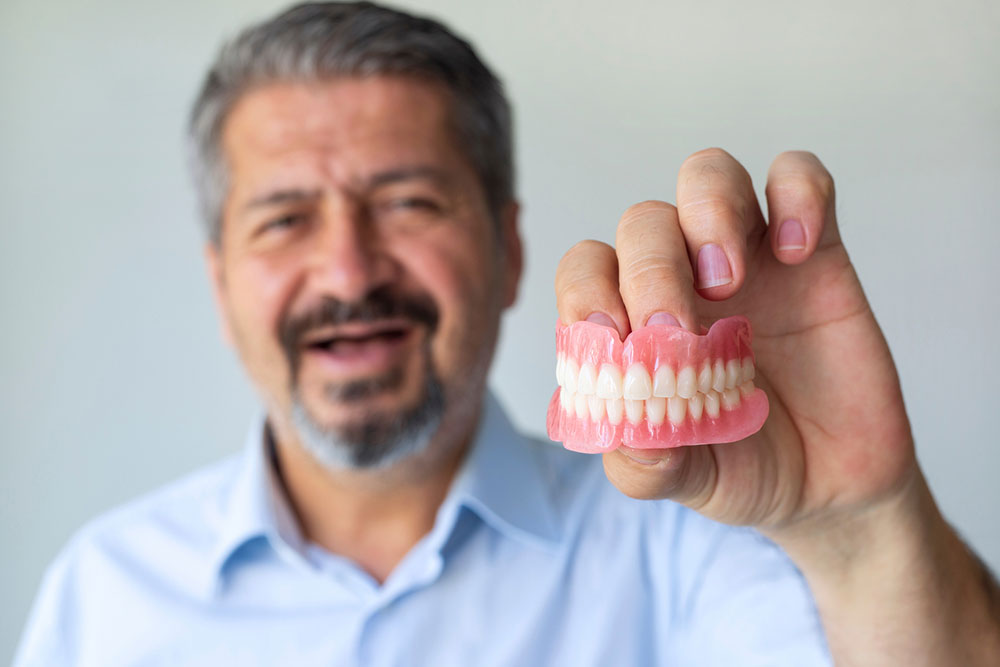7 tips for choosing the right dentures

Dentures are artificial teeth that are used to replace missing teeth. Whether trying to manage a few missing teeth or going for a full arch replacement, selecting the right dentures is crucial. Making the right decision ensures optimal oral health, functionality, and comfort while using dentures. Choosing dentures is a collaborative process between the patients and their dentist, in which, they need to consider a variety of factors to make an informed decision.
1. Consult a dentist
Speaking to a dentist is crucial when considering dentures. A qualified prosthodontist or dentist will prioritize assessing one’s oral health and then coming up with suitable treatment options. They will also be able to share the finer details about various types of dentures, their drawbacks, and their benefits. The consultation will help one determine the most suitable option that fits their budget and their requirements.
2. Compare different types of dentures
Dentures come in different types, catering to unique oral health needs. A dentist can help one choose from various types of dentures—partial dentures, full dentures, and implant-supported dentures. Full dentures are meant for those who have lost their natural teeth in the upper or lower jaw arch. They are considered traditional dentures and consist of artificial teeth and a gum-colored base. Partial dentures, on the other hand, are a good choice for those with a few missing teeth. They come with special clasps that hook around the natural teeth. Finally, implant-supported dentures are anchored to dental implants surgically placed in the jawbone, offering enhanced stability and functionality compared to other types of dentures.
3. Consider the materials
In addition to choosing the type of dentures that align with one’s oral health needs, one should also take the material and appearance of dentures into consideration. Dentures are typically made from acrylic, porcelain, or a combination of both materials. The dentist can help one determine the right material and understand associated precautions, care, and side effects. Factors such as durability and aesthetics should also be considered while choosing the material for dentures. One should ensure the dentures they get match the shade of the natural teeth. Dental labs can get the color right by also taking into account factors like age and complexion.
4. Assess comfort
Comfort is crucial when getting dentures. Ill-fitting dentures can fall off or be excessively tight, cause irritation, and make it difficult to chew and speak. So, one should go for custom-fitted dentures that are tailored to the unique contours of one’s mouth and gums. The dentist will take precise measurements and impressions to ensure a snug fit. To ensure optimum fit and avoid any problems later, one should get other dental procedures out of the way before getting dentures. One can also ask the dentist to make adjustments if the dentures are uncomfortable.
5. Check functionality and bite alignment
Dentures are meant to replace missing, broken, or otherwise damaged teeth. So, they should not only look like natural teeth but also perform similar functions like helping with chewing and speaking. This is a key factor to consider when getting dentures. The dentist will assess the bite alignment and jaw movements to ensure the dentures restore the functionality of the teeth. But, even after the dentures have been fitted, one might need to visit the dentist to make adjustments. This can help one achieve optimal bite alignment and comfort. An abnormal bite alignment could make wearing dentures uncomfortable and even painful, especially while eating.
6. Consider maintenance
Proper maintenance and care are essential for prolonging the lifespan of the dentures and also maintaining good oral hygiene. So, one should consider their daily lifestyle and daily activities when choosing dentures. One can discuss their preferences with the dentists to determine the most suitable and easy to maintain option. Then, one should follow the dentist’s instructions for cleaning and storing dentures and schedule regular check-ups for adjustments and professional cleanup.
7. Check cost and insurance coverage
The cost of dentures can vary significantly depending on the type and material chosen. One can check with the dental insurance provider to see if they offer coverage for getting dentures. If they do, one should check the extent of coverage and out-of-pocket expenses. One can also get a detailed breakdown of costs from the dentist and discuss payment options and financing plans with them.



